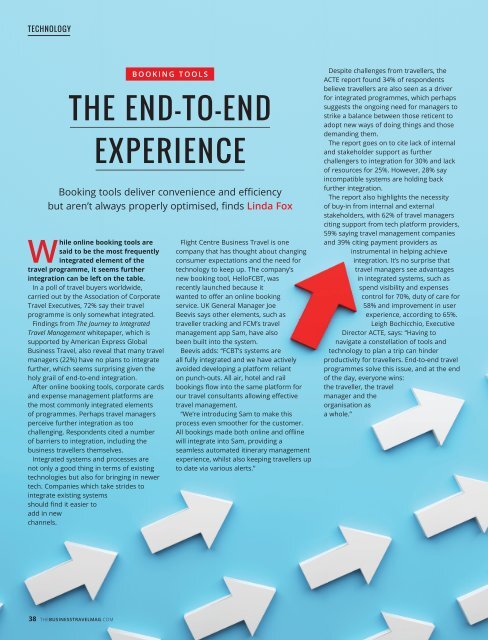You also want an ePaper? Increase the reach of your titles
YUMPU automatically turns print PDFs into web optimized ePapers that Google loves.
TECHNOLOGY<br />
While online booking tools are<br />
said to be the most frequently<br />
integrated element of the<br />
travel programme, it seems further<br />
integration can be left on the table.<br />
In a poll of travel buyers worldwide,<br />
carried out by the Association of Corporate<br />
<strong>Travel</strong> Executives, 72% say their travel<br />
programme is only somewhat integrated.<br />
Findings from <strong>The</strong> Journey to Integrated<br />
<strong>Travel</strong> Management whitepaper, which is<br />
supported by American Express Global<br />
<strong>Business</strong> <strong>Travel</strong>, also reveal that many travel<br />
managers (22%) have no plans to integrate<br />
further, which seems surprising given the<br />
holy grail of end-to-end integration.<br />
After online booking tools, corporate cards<br />
and expense management platforms are<br />
the most commonly integrated elements<br />
of programmes. Perhaps travel managers<br />
perceive further integration as too<br />
challenging. Respondents cited a number<br />
of barriers to integration, including the<br />
business travellers themselves.<br />
Integrated systems and processes are<br />
not only a good thing in terms of existing<br />
technologies but also for bringing in newer<br />
tech. Companies which take strides to<br />
integrate existing systems<br />
should find it easier to<br />
add in new<br />
channels.<br />
BOOKING TOOLS<br />
THE END-TO-END<br />
EXPERIENCE<br />
Booking tools deliver convenience and efficiency<br />
but aren’t always properly optimised, finds Linda Fox<br />
Flight Centre <strong>Business</strong> <strong>Travel</strong> is one<br />
company that has thought about changing<br />
consumer expectations and the need for<br />
technology to keep up. <strong>The</strong> company’s<br />
new booking tool, HelloFCBT, was<br />
recently launched because it<br />
wanted to offer an online booking<br />
service. UK General Manager Joe<br />
Beevis says other elements, such as<br />
traveller tracking and FCM’s travel<br />
management app Sam, have also<br />
been built into the system.<br />
Beevis adds: “FCBT’s systems are<br />
all fully integrated and we have actively<br />
avoided developing a platform reliant<br />
on punch-outs. All air, hotel and rail<br />
bookings flow into the same platform for<br />
our travel consultants allowing effective<br />
travel management.<br />
“We’re introducing Sam to make this<br />
process even smoother for the customer.<br />
All bookings made both online and offline<br />
will integrate into Sam, providing a<br />
seamless automated itinerary management<br />
experience, whilst also keeping travellers up<br />
to date via various alerts.”<br />
Despite challenges from travellers, the<br />
ACTE report found 34% of respondents<br />
believe travellers are also seen as a driver<br />
for integrated programmes, which perhaps<br />
suggests the ongoing need for managers to<br />
strike a balance between those reticent to<br />
adopt new ways of doing things and those<br />
demanding them.<br />
<strong>The</strong> report goes on to cite lack of internal<br />
and stakeholder support as further<br />
challengers to integration for 30% and lack<br />
of resources for 25%. However, 28% say<br />
incompatible systems are holding back<br />
further integration.<br />
<strong>The</strong> report also highlights the necessity<br />
of buy-in from internal and external<br />
stakeholders, with 62% of travel managers<br />
citing support from tech platform providers,<br />
59% saying travel management companies<br />
and 39% citing payment providers as<br />
instrumental in helping achieve<br />
integration. It’s no surprise that<br />
travel managers see advantages<br />
in integrated systems, such as<br />
spend visibility and expenses<br />
control for 70%, duty of care for<br />
58% and improvement in user<br />
experience, according to 65%.<br />
Leigh Bochicchio, Executive<br />
Director ACTE, says: “Having to<br />
navigate a constellation of tools and<br />
technology to plan a trip can hinder<br />
productivity for travellers. End-to-end travel<br />
programmes solve this issue, and at the end<br />
of the day, everyone wins:<br />
the traveller, the travel<br />
manager and the<br />
organisation as<br />
a whole.”<br />
38 THEBUSINESSTRAVELMAG.COM

















